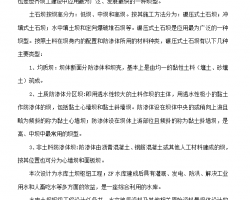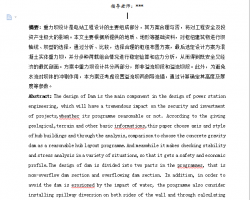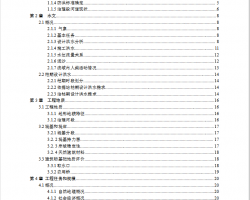ժ Ҫ�������������С���r(n��ng)��ˮ���ĸ���l(f��)չ����(chu��ng)�����S���µĽ�(j��ng)���ȡ����һ����Ч������ƄӸĸ����뽡���M�У�ʹ�r(n��ng)��ˮ�����O�c������������������������Ҏ(gu��)�������ƻ�܉������Ҫ���ĸ�˼·����Ӵ����߆��}�M���J���о����������@��Մ���c��������������
Pick to: in recent years, around the small rural water conservancy reform of booming development, created many new experiences, and achieved some results. How to promote the further health reform, the policy gradually improve rural water conservancy construction and management, normalization and legalization orbit, in-depth reform train of thought and policy issues have to be careful study. The author talk about some views, here for your reference.
�����P�I�~��С���r(n��ng)��ˮ�����ĸ˼·
Key words: small rural water conservancy; Reform; Train of thought
������һ��С���r(n��ng)��ˮ�������c�c���|(zh��)
A, the characteristics and nature of small rural water conservancy
��������һ��С���r(n��ng)��ˮ�������c
(a) the characteristics of small rural water conservancy
����ͨ���ѹ����e���f����������e���f��������������������ÿ�����µĹ��̽綨��С���r(n��ng)��ˮ��������С���r(n��ng)��ˮ�����̷N��ܺܶ࣬���w�ɚw�{�������Сˮ����������ˮ�ص���ˮ�Oʩ��С�͔r���l������ˮ�l���؝�������ˮ�Oʩ���������ܵ����l�T��ݔˮ��ˮ�Oʩ���ɲ������������������������Ƚ��潨�����վ���C������ˮ�Oʩ����ˮ���������������ι����l����“С����”�����g��ˮ�Oʩ�����o���(zh��n)���r(n��ng)���С�������ӵ��̷��ȷ����Oʩ����ˮ�l���ŝ���վ����ˮ�������°��ܵ��ŝ����n�Oʩ���l(xi��ng)���ԁ�ˮ�S��ˮ�ѵ����ˮ�Oʩ����(j��)����ȫ�y(t��ng)Ӌ��ȫ���s�У��������f̎С���r(n��ng)��ˮ��������
Usually the irrigation area of 10000 mu, and waterlogged area of 30000 mu, channel flow under 1 cubic meters per second as small rural water conservancy project engineering. Small species of rural water conservancy projects and many functions, can be roughly divided into the following categories: small reservoir and shuitangba, pools, such as water storage facilities, small DAMS and sluice gate structure, water diversion sluice, cut the undercurrent water diversion facilities, such as channels, pipe, valve and other water water distribution facilities, aqueduct, tunnel, inverted siphon, bridge, culvert, such as cross structures, pump stations, water facilities such as the shaft, irrigation ditch, strip, sprinkler irrigation, drip irrigation, brake pipe, such as "little white dragon" field irrigation facilities, small towns, farmland protection WeiDi dikes, river flood control facilities, such as outlet, drainage pumping stations, drainage and underground drainage tubes drainage JiangZi facilities, rural waterworks, water cellar life water supply facilities, etc. According to incomplete statistics, there are about 20 million small rural water conservancy projects in the country.
����С���r(n��ng)��ˮ�������c��һ�ǵ�λ������Ҫ����Ҫ�߶���ҕ������Ⱥ���ԏ�����Ҫ�V���r(n��ng)���c�����ǹ������^������Ҫ�������������Ǿ��ЉŔ�������Ҫ�����ӏ����^�������r(n��ng)��ˮ���Oʩ���̎�r(n��ng)���Ұ���o��ֵ�����L���Օ����������ϻ��p�����������̶����S�o���������������ˮ������������(sh��)���̼���(ji��)��ʹ�����r(n��ng)��ˮ���Ľ��O�c������Ҫ��������Ҏ(gu��)���cӋ��ָ���������M����
The characteristics of small rural water conservancy: one is the important position, needs to pay close attention to. Second, the mass is strong, need to farmers to participate in. Three is the public welfare is stronger, needs government support. Four is a monopoly, the need to strengthen government macro management. Rural water conservancy facilities located in farmland wilderness, unattended; The storm or aging damage; Earthworks, maintenance workload. In addition to the life water supply project, most engineering seasonal use. Rural water conservancy construction and management need to be under the guidance of the government's plans for the planning and orderly.
�����������r(n��ng)��ˮ�������|(zh��)
(2) the nature of the rural water conservancy
�����r(n��ng)��ˮ�����r(n��ng)������Ȼ�ĺ��������r(n��ng)�I(y��)���a(ch��n)���r(n��ng)���������r(n��ng)�����B(t��i)�h(hu��n)���l���Ļ��A�Oʩ���Ǵ��M�r(n��ng)�I(y��)���a(ch��n)���r(n��ng)�����յ����|(zh��)���ϗl�������r(n��ng)�����õ����������r(n��ng)��ˮ���c�r(n��ng)���·���r(n��ng)�幩늵�ͬ���r(n��ng)�幫�����������r(n��ng)�I(y��)���r(n��ng)������������wϵ�ĽM�ɲ��֣������^���Ļ��A������������
Rural water conservancy is a farmer resist natural disasters, improve agricultural production and farmers' life and rural ecological environment condition of infrastructure, is to promote agricultural production, increasing farmers' income so as to ensure the material conditions. Except for farmers use micro engineering, rural water conservancy and rural roads, rural electricity supply belong to the rural public works and is part of the agriculture and the rural social service system, strong basic, public welfare.
�����r(n��ng)�����r(n��ng)��ˮ���I(y��)�����w�������r(n��ng)����Ը�������r(n��ng)��������������kˮ�����ǰl(f��)չ�r(n��ng)��ˮ���I(y��)�Ļ���ԭ�t���r(n��ng)��ˮ������ּ�Ƿ��������d�������Ĺ�������Ҫ�m���Ј���(j��ng)��Ҫ�����Ѓ�����������ɱ��������M������ʹ���������\�У���Ҫ�Գֲ��ԠI����Ŀ�ĵ���ּ�����P���ɺ����ߌ��������_Ҏ(gu��)����
Farmers are the main body of rural water resources projects. Respecting farmers' will, rely on the power of the farmers, do water conservancy cooperation, is the basic principle of rural water conservancy development. Rural water conservancy purpose is service. Give priority to in order to create project, both to adapt to market economy requirements, paid services, cost accounting, reduce costs, prompted engineering benign operation, and to adhere to the principle of not for-profit. Relevant laws and policies have specific provision.
�����������������Й����M����ˮ�����M��
Second, the clear ownership, forming water cooperation organization
������“�l�������lؓ�����lͶ�Y���l����”���r(n��ng)��ˮ���w�Ƹĸ�Ҫ���ص���Ҫԭ�t֮һ�����w���f����ͬ����̣������в�ͬ�����w����
"Who benefits, who pays and who invest, who all" rural water conservancy reform is one of the important principles to follow. Specifically, the different types of projects, different management system should be carried out.
������һ���r(n��ng)�����õ�����������“�Խ������С��Թ�������”�w��
(a) farmers own miniature project, implement the "build, own, since the tube, for private use" system
�����r(n��ng)�����Þ������������Ṥ�̣������������ڽ�(j��ng)�M�Ͻo���a�����@��������r(n��ng)��ļ�ͥ˽��ؔ�a(ch��n)���l(f��)�o�a(ch��n)���C���ܷ��ɱ��o��
Farmers own miniature led to storage project, the government can discretionary spending on subsidies. This kind of project as a farmer's family, private property property right card, protected by law.
�����r(n��ng)�����й����Լ��ò����ˮ�����S���r(n��ng)��֮�g����ƽ�ȅf(xi��)�����������ݡ��Ѓ����յ�ԭ�t���{(di��o)����ȱ����ְl(f��)�]���̺�ˮ�YԴ���Ч����
Farmers owned engineering to burn our own water, allow between farmers, according to the equal consultation, mutual benefit and reciprocity, the principle of paid services, dispensing, we give full play to the project and the best benefit of water resources.
�����������^���r(n��ng)�������С����ˮ�����������ж�N��ʽ���r(n��ng)����ˮ�����M�������w��
(2) more small farmers benefit from the public water conservancy project, the implementation of various forms of farmer cooperation organization management system with water
���������r(n��ng)���^�����e�ǿ�����l(xi��ng)��С����������������ˮϵ����ϵ�������M����ˮ��f(xi��)���ȶ�N��ʽ���r(n��ng)����ˮ�����M�����@�N�w�����������c�����ȣ��������l(xi��ng)���������^(q��)���M����������ˮ�����O����������Ҫ�������Ա��_�l(xi��ng)�����ˮ�M���x��܇���M�����Ų�õȆ��}���ڶ������_��ˮ���ǽ��O���w��Ͷ�����w�����������w���������w���γ�������ˮ�����M����~�������湲ͬ�w���������C���`���������kˮ��������Ҫ���X�ij��X�������ij��������O��ij��O������������Q�������Y�Q�����Թ��Q�����Թ��Qˮ��ÿ���ɆT�ę�����؟�κ͑��M�x�ն������³��k�������ģ������M��Ҫ������Ҏ(gu��)��ע�Ե�ӛ���ɞ��з��˵�λ�ķ��Ռ��w���ܷ��ɱ��o���ܪ����Г�����؟�������壬�����M�����³��������x�eؓ؟�ˣ��ڃ�(n��i)�����������f(xi��)�̷����Q���ɆT���������Y�֔��Լ�ˮ�MӋ�յȴ��¡�
Benefit farmers more, especially across different village or township small public works, shall be according to the water system, scope of canal system, formation water user association, and other forms of rural cooperation organization with water. This system has the following characteristics: first, it is not in accordance with the township, village administrative divisions to form, more in line with the special requirements of water conservancy construction and management, can avoid the township and village borrow or interception misappropriate the water in the name of a lift. Second, clear water users are the subjects of construction, investment main body, the owner and the benefit main body, formed by water cooperation organization as a link the interests of the community. Third, flexible mechanism. Cooperation office of water, is to the rich pay, powerful output, equipment of the equipment, to exchange Labour, to exchange Labour, to exchange Labour, in order to change water, each member's rights, responsibilities, and its obligations in accordance with the articles of association. Fourth, cooperation organization registered according to law, and become a service entities with legal person status, protected by law, and can independently bear civil liability. Fifth, cooperation organization have articles of association, head of democratic election, internally democratic consultation methods members decided to work, investment allocation and water rate collecting things.
������������(j��ng)�I�Ե�С���r(n��ng)�幩ˮ���̰�“�ɷݺ�����”��I(y��)�w���\��
(3) the management of small rural water supply project in accordance with the "share cooperation enterprise system operation
���������l(xi��ng)����I(y��)�����@���Nֲ�����B(y��ng)ֳ����ˮ���������д������ˮ�΄յ��r(n��ng)�幩ˮ������������“�ɷݺ�����”��I(y��)�k���M����I(y��)���ˌ��w��������I(y��)��(n��i)�ڄ���ƽ�ȳֹɡ�������(j��ng)�I���ڄ����c��������Y�ϣ��ɱ��̈́ڄӹ�ͬ�ּt���k�������@�N�����w�������a(ch��n)�������������ߵę���؟����ʮ�����_�����^���ă�(n��i)�ڽ�(j��ng)�I���������˽�Q���O�Y����Ć��}�������������X��“���”Ͷ�Y��������o�����Ͷ�Y�؈�Ҫ��ֹ���F(xi��n)“ˮ��”�Ŕ��l(xi��ng)���幫����ˮ�Oʩ�����ù���ˮ�YԴIJȡ��������r���ķ����r(n��ng)�幩ˮ���A�Oʩ���O���l(f��)���ط�����Ҳ�ɡ������錦���̽��O�o���a�����@�����Y���γɵĹə�������������������ͨ�^�ֹɅ��c�O(ji��n)����I(y��)��(j��ng)�I������
To the rural enterprise, orchards, plantation, farming water supply is given priority to, with the villagers living water task of rural water supply project, should refer to "share cooperation enterprise to form a legal entity, ensures equal shareholding enterprise, cooperative management, owners and employees combine, equity and work together to share out bonus. Under this management system, clear property rights, the owner of the rights and responsibilities, clear, strong internal business vitality. In order to solve the problem of insufficient construction funds, can absorb the rich "investors" investment, and a reasonable return on investment. But to prevent "water heater" monopoly township, village public water facilities, or using the public water resources for profiteering. From supporting the rural infrastructure construction of water supply, local governments also can take into consideration the subsidies in engineering construction, this part of the capital formation of equity should be the government, the government through shareholding enterprise supervision and management.
������ʽ�`����Ӽӏ���(j��ng)�I����
Three, flexible and varied forms to strengthen the operation and management
���������_���r(n��ng)��ˮ�������Oʩ�w��ˮ�����w����������“�I(y��)��”����ˮ�����M��߀��횲����`����ӵ���ʽ���ӏ���(j��ng)�I�������䌍���̾S�o�����ͷ���؟����ǧ����Ӌ�l(f��)�]����Ч�档
Has been clear about the rural water conservancy over the water user collective public facilities, as the "owner" of the water cooperation organization also must adopt flexible and varied forms, strengthen management, to carry out the engineering maintenance and management and service responsibility, one thousand party hundreds of engineering benefits into full play.
������һ����ˮ�����M���Լ�ֱ�ӽ�(j��ng)�I����
(a) water cooperation organization oneself management directly
�����@�N��ʽ�m�ø���r(n��ng)��ˮ�����̡������ɞ鮔ǰ�ͽ���r(n��ng)��ˮ�������ƶȸĸ����Ҫ��ʽ�����ᳫ��Ŀǰȫ�����������Ĺ����Ԍ������^���l(xi��ng)��“���w”������������Ҏ(gu��)������ˮ�����M��������(j��ng)�I������
This approach applies to all kinds of rural water conservancy projects. Should be the current and future rural water management system reform, the main way to advocate. China now nearly 80% of engineering implement so-called country "collective" management, shall gradually specification for water cooperation organization independent operation and management.
������������ˮ�����M��Ƹ��“����”��(j��ng)�I����
(2) of the water cooperation organization to hire "wise men" operation and management
������ˮ�����M����(n��i)���Ҳ������m���x�r������Ƹ���ⲿ��“����”���wؓ؟��(j��ng)�I��������Ƹ�ߞ���ˮ�����M��“��”���Iȡ�������ˮ�����M������Ƹ�߱O(ji��n)������ʹ�����������̵��ճ���(j��ng)�I����ؓ��؟������÷�����
Cannot find a suitable candidate, water cooperation organization can hire outside of the "wise men" to be responsible for operation and management. By hiring "working" for a water cooperation organization, receive the payment. Water cooperation organization to supervise the organizations, to promote its real daily operation and management for the engineering responsibility, do well the service.
�����������а�
(3) contracts
�����а�����׃�������Й�������ͨ�^��ͬ���s���ɹ��̵������߰ѹ����ί�нo�а�����ͬ�r���p��������؟�����x�սo�����_���а��߱Ⱥ����M��Ƹ�õĹ���ؓ؟���и�������������а��߿����Ǻ����M����(n��i)���ɆT��Ҳ����������ϵ���������һ������Ҳ�����ǎׂ��˽M�ɵ�С�M��
Don't change project contracting all the ownership. It by contract, by the project owner delegates authority to the contractor, give clear rights, responsibilities and obligations for both sides at the same time, the contractor has more than cooperation organization hire management, head of greater autonomy. Contractors can be cooperation organization member, also can be a social person, can a person, can also be a panel composed of several people.
�����а����������������^�õؽ�Q�˹��̾S�o������������؟�β��䌍�Ć��}���ױ��r(n��ng)����ܣ����ж��ꌍ�`��(j��ng)����m���ڸ��N��͵��r(n��ng)��ˮ�������Oʩ��Ŀǰȫ���s�У������Ĺ��̲����@�N��ʽ�����������r(n��ng)��ˮ����(j��ng)�I����C�Ƹĸ����Ҫ��ʽ֮һ�����ᳫ��
Contracting method is simple, easy to follow and solve the engineering maintenance and management, management responsibility not to carry out the problem, easy to be accepted by the farmers, for many years practical experience, is suitable for various kinds of rural water conservancy infrastructure. About 10% of the whole country at present the project in this form, shall be used as the rural water conservancy management mechanism reform of one of the main ways to promote.
�������ģ����U
(4) the lease
����������f�����c�а���(j��ng)�I�������ͬһ��ͣ���鹤�����Й��]�и�׃��ֻ�����Й��c��(j��ng)�I�������x�ø��Mһ�������U���ڽ�(j��ng)�I�������и���������������U�߿��ԏ�ֱ�ӻ��g�ӵĽ�(j��ng)�I�����Ы@ȡ�����ͬ�rҲ�Г�����Ľ�(j��ng)��؟�κ��L�U�����“���U”��Ҫ�m���ڽ�(j��ng)�I���^��������������(j��ng)�I����ؓӯ̝���r(n��ng)��ˮ��������
Strictly speaking, it and contracting management belong to the same type, because the ownership of the project has not changed, only further separation of ownership and management right, the renter have more autonomy in management. The renter can, for a price from the direct or indirect business profits, but also more economic responsibility and risk. So "lease" is mainly suitable for operational stronger, can operate independently, self-financing, rural water conservancy projects.
�������壩“���u”��(j��ng)�I�����
(5) "auction" management control
����“���u”�r(n��ng)��ˮ���Oʩ��(j��ng)�I�����������N�L�U��һ��ُ�I�߲���ȡ���A���������������ϳ��صĂ���ؓ��������ُ�I���ӊZʽ���_�l(f��)ˮ�YԴ���C�������Oʩ�����̓p�Ĉ�U��߀���V��Ⱥ����ʰ“������”�����³��YͶ��������ُ�I�߸�׃������;�����鿹�����Ă����B(y��ng)ֳ���ܺ���Ҳ�ǏV����ˮ�����@�N������Ҫ�m���ڽ�(j��ng)�I���^���Ĺ����Oʩ����ȫ�����������f̎�����мs�н���������“���u”��ʽ��
"Auction" rural water conservancy facilities management right there are three types of risks: one is the buyers can not achieve expected profits, even back heavy debt burden; 2 it is buyer's predatory development of water resources (shaft) or engineering facilities, engineering after damage to scrap, still have to let the masses gathered "mess", contributive work-relief funds again; Three is the buyer change the project purpose, let the flood control and drought obey personal cultivation, the victims are large water users. This method is mainly used in the business strong engineering facilities. About nearly 3% in the national 20 million project "auction" way.
������������������؟���ӏ����^�{(di��o)��
Fourth, the government duties, strengthen the macroeconomic regulation and control
�������Ƅ��r(n��ng)��ˮ���I(y��)��������l(f��)չ��Ҫץ�������P�I��һ�ǰl(f��)�]�r(n��ng)��Ⱥ�����w��������Q�w�Ʋ�혵Ć��}�������`���\���Ј��C�����ӏ���(j��ng)�I��������Q�\�ЙC�Ʋ���Ć��}�����Ǽӏ������������������÷��ձO(ji��n)�����ṩ��Ҫ�Ĺ������պ����a(ch��n)Ʒ�����w���c�C�Ƹĸ(chu��ng)�������ĭh(hu��n)���l��������ȱһ�������������ṩ�Y���������O��ȷ��֣�����������r�µ��Y���a���Ͱl(f��)���ش���Ȼ�ĺ��r���a�������壬ͨ�^���������ƻ��Ӽ��g�ƏV�����wϵ���ṩ���̽��O�c�����еļ��gָ������Ϣ����Ӗ�����������ȷ��������������r(n��ng)��ˮ�YԴ�_�l(f��)�������r(n��ng)��ˮ����(j��ng)�I�������M�бO(ji��n)������ֹ�����a����(j��ng)�M���r(n��ng)���Y����ȡ��ˮ�M������Ų�ã���ֹ�o��ƽ�{(di��o)�r(n��ng)��Ͷ������ֹ�Ŕ���YԴ���ֺ��r(n��ng)��������`����r�l(f��)����
Promote health and booming rural water resources projects, should pay special attention to the three key: one is to play a role of peasants subject, solve the problems of the system; Second, flexible use of market mechanism, strengthen management, solved the problem of living of the operating mechanism; Three is to strengthen government guide farmers, completes the service supervision, provide necessary public services and public products, create favorable environmental conditions for system and mechanism reform, the landscapes themselves. Fourth, to provide funds, materials, equipment and other support, including funding for normal conditions for subsidies and catastrophic natural disasters; Fifth, through establishing and perfecting technical extension service system at the grass-roots level, to provide technical guidance in the engineering construction and management, information, training, science popularization and other services; Sixth, water resources development and utilization in rural areas, rural water conservancy management supervision, prevent the government subsidies, farmers raise and collection of water interception misappropriate, prevent TouGong level farmers free of charge, to prevent the monopoly of public resources, farmers interests such as illegal case.
�����P��С���r(n��ng)��ˮ���ĸ�����Q���}���S���˰�С���r(n��ng)��ˮ���ĸ�w�Y��“�a(ch��n)���ƶȸĸ�”���@�Dz��ʴ_�������]��ȫ�����ʴ_�ر��_���r(n��ng)��ˮ���ĸ��S���ă�(n��i)�����P�I���ڣ�����ʹ���`�����ƺ�ֻҪ��Q�ˮa(ch��n)�����}��һ�І��}��ӭ�ж��⣬����“һ�u��֮”���a(ch��n)���ƶȸĸ����r(n��ng)��ˮ���ĸ��(n��i)�ݵ�һ������������ȫ�������Է��՞���ּ���ǠI�����|(zh��)��ǰ���£��^�֏��{(di��o)“�a(ch��n)��”���]��̫�����|(zh��)���x�����Й�һ��Ҫ���������������wһ��Ҫ��λ���@�Ǹĸ�������c�������С���r(n��ng)��ˮ���ĸ�������齨�O�c�����ƶȸĸҲ���Ժ��Q“�����ƶȸĸ�”��
About the name of a small rural water conservancy reform. To many small rural water conservancy reform property right system reform ", this is not accurate, it does not fully and accurately express the rich connotation of the reform of rural water conservancy and key, easy to misleading, seem to be as long as can solve the problem of property rights, all problems are solved, and even "YiMaiLeZhi". Property right system reform is part of the rural water conservancy reform content, but not all of them. In terms of service for the purpose, under the premise of non-profit, too much emphasis on "property rights", don't have much substance. Property rights must be clear, the owner subject must be in place, this is the breakthrough point of the reform. So small rural water conservancy reform should be summed up as the construction and management system reform, can also be referred to as "management system reform".





